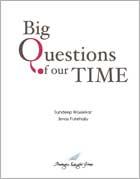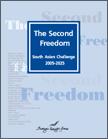Can Our Science Make Us God?
 |
September 2007
By Sundeep Waslekar
|
A few years ago, I received a letter from a group of scientists belonging to the well-known Mensa association of high IQ persons. They wanted Strategic Foresight Group to develop scenarios on results of the particle collider experiment. Since I did not have a physicist and a mathematician in our team, I did not respond to the Mensa group. In any case, I knew nothing about the particle collider experiment. Now that I have learnt something about it, I have misplaced the Mensa letter. (I hope the scientists write back if they happen to read this column.) I believe that a scenario building exercise about the results of this experiment would be extremely exciting.
The particle collider experiment is hosted by CERN, European equivalent of NASA, in the world�€™s most expensive tunnel laboratory built underground on the border of France and Switzerland, near Geneva. The experiment will involve colliding atoms of gold and lead, some of the heaviest elements, at the speed of light from two opposite directions. A special accelerator is being built for this purpose. Several governments have contributed billions of dollars (or euros) with a hope that the experiment will recreate the experience of big bang and offer us a magical font of a new treasure of energy. It will help us to understand the evolution of the universe and reinvent science.
The sceptics of the experiment are actually worried about its success going too far. They argue that if a real big bang takes place, it will instantly produce black holes which can absorb the tunnel, in which the experiment will be conducted, then the European continent, then the earth, and finally even parts of the universe. Sir Martin Rees, Britain�€™s leading scientist, says in his book �€˜Our Final Century�€™ that the risk of such fears realising is not zero. However, it is very low. Sir Martin puts it at one upon fifty million. He says that there is even a higher risk of the experiment producing strangelet, a new material created from fusion that will go on expanding and absorbing everything that is there in the environment. It will eventually (in a matter of some hours) absorb the globe.
A probability of one upon 50 million may appear very negligible at the first glance. However, the first glance is often superficial. I once had a medical problem in my family, which I was told occurred with a probability rate of one upon a million. To me this meant one upon one. To my family and friends, it meant one upon hundred circumstances they knew of that produced such a situation. To the friends of my friends who heard about it indirectly, it was a probability of one upon a few thousands. To you, it may mean one upon a million. But when it actually happens, the probability of one upon a million or 50 million is only an academic equation. It is one upon one. In this case, since I was the only one affected (or my immediate family), the consequences were restricted. However, if the experiment is by its nature designed to have an impact on the earth, the consequences can be unlimited. I hope the governments investing in this project and the scientists who have lobbied for it have got it right. If it succeeds, we would have played God. If it fails, we will not be there to regret.
If we are curious about the origin of the universe, we are equally perplexed about the origin of life. We know that it began with single cell entities, which then evolved into more and more complex creatures. However, we don�€™t know exactly when and how the first cell came into being and exactly when and how the complexity reached the level, which we can call life. The process of evolution has resulted in several mergers and acquisitions of cells. In fact, some scientists may call human beings, monkeys, fish and insects merely communities of cells in different combinations �€“ in fact slightly different combinations.
In June this year, Craig Venter Laboratory in the United States announced that it had succeeded in creating the first ever synthetic life in the history of the planet. They engineered migration of genome from one species of bacteria to another to produce a new species of bacteria. The scientists at this laboratory are hopeful of manufacturing germs that can absorb CO2 from air. This can hopefully solve the global warming problem. It can also in theory create risk of somebody producing bacteria that absorbs oxygen instead of CO2 and finish the earth in future germs warfare.
There are other scientists that are trying to produce artificial human chromosome, capable of producing designer babies, while others are trying to use nano-technology to blend human brain with computers. In brief, we are attempting to create life of our choice, the job that has been reserved for God in all societies and cultures. The most successful of all these experiment is of course genome transfer and synthetic cell production at Craig Venter Laboratory. It will be interesting to see how far the scientists go in extending this experiment �€“ from germs to animals to human beings?
Some scientists are experimenting deep inside the cell. Others are playing around in the outer space. In 2007, China destroyed a harmless weather satellite. It was a flag march to announce that the Chinese space scientists can make a lot of things possible. Already they have proved that they can grow vegetables in space and use lasers to block China being captured by enemy satellites. In recent years, the Chinese have been recruiting a large number of engineers and scientists in the People�€™s Liberation Army. Of course, the Chinese are not alone in this game. They will soon join the Americans, the Russians, the Japanese and the Indian in a race to conquer the moon. When Apollo 11 travelled from the earth to the moon in July 1969, it was the first ever journey from one celestial body to another. By the time, some people gather to celebrate its first centenary in 2069, celestial travel would be a fun game of the rich and the post-humans?
Ah, the post-humans! We will examine this subject some other time in the future. The experiments we are talking about today are not from pages in science fiction. They are real. They are happening today. If they succeed, our science will have made us God. And what if they fail? I sincerely hope that the Mensa scientists write to me after reading this column so that we can conduct our scenario-planning exercise.
Related Publications
-
.jpg&maxw=50)
Big Questions of Our time: The World Speaks, 2016
Download:Big Questions of Our time: The World Speaks _Full Report
-

-

Second Freedom South Asian Challenge 2005-2025, 2005
read more
Download:Second Freedom South Asian Challenge 2005-2025 Full Report
Related latest News
Related Conferences Reports
-

Global Challenges Conference, October 2016
Download:Global Challenges Conference Report
-

Conference on Responsibility to the Future: Business, Peace and Sustainability, June, 2008
Download:Global Security and Economy: Emerging Issues


